49 min read
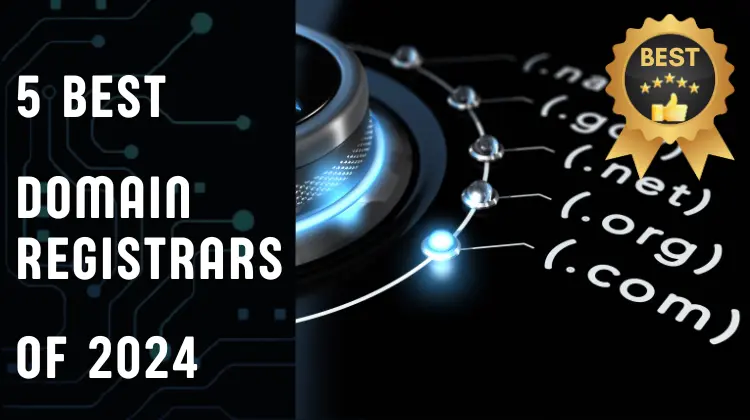
Hello, my friends! Welcome to the ultimate guide on finding the best domain registrars to kickstart your online journey in 2024! 🚀
Ever thought about what makes your favorite websites so memorable? Well, it all starts with that unique address you type into your browser—their domain name.
Let’s start with the basics: What exactly is a domain name? Think of it as your digital address on the internet—it’s what people type into their browsers to find your website. Just like your home address helps friends locate your house, a domain name directs visitors to your online space. Without a memorable and relevant domain name, it’s like trying to find a needle in a haystack on the vast web. That’s why choosing the perfect domain name is crucial for websites aiming to make a mark in the online world.
But hold on, Before you can claim your spot in cyberspace, you need to team up with a reliable domain name registrar. Now, what on earth is that? Picture this: if your domain name is your digital address, then the domain name registrar is like your real estate agent, helping you secure and manage your online property. These registrars play a vital role in getting your website up and running smoothly. They handle the nitty-gritty technicalities of domain registration, ensuring that your chosen domain name is yours and yours alone. Without them, navigating the complexities of online presence would be akin to sailing uncharted waters.
Why does it matter which domain registrar you choose? Ah, that’s where the plot thickens. Picking the best domain registrars can make or break your online aspirations. It’s not just about snagging a catchy domain name; it’s about entrusting your digital identity to a partner that’s reliable, secure, and supportive. After all, your website’s success hinges on factors like uptime, security features, and customer support, all of which are influenced by your choice of domain registrar.
Now, you might be wondering, “How do I separate the cream of the crop from the mediocre?” Fear not, dear reader, for that’s precisely where this guide comes into play! We’ve scoured the digital landscape to bring you the lowdown on the best domain registrars of 2024. Think of us as your trusty sidekick, equipped with insider knowledge and a keen eye for detail. Together, we’ll navigate the maze of options and find the perfect match for your online ambitions.
So buckle up and get ready to embark on a journey through the realm of domain name registrars. Whether you’re a seasoned website owner or a newbie venturing into the digital wilderness for the first time, this guide is your ticket to success. By the time we’re done, you’ll be armed with the knowledge and confidence to make an informed decision, because when it comes to claiming your corner of the internet, only the best domain registrars will suffice.
Overview of 5 Best Domain Registrars of 2024
Namecheap
Starting Price for .com: $5.98 for the first year
Renewal Price: $13.98 per year
Free WHOIS privacy is available for life-time.
GoDaddy
Starting Price for .com: $11.99 for the first year
Renewal Price: $21.99 per year
Free WHOIS privacy is available.
Free Domain Privacy Protection is available
Hostinger
Starting Price for .com: $9.99 for your first year
Renewal Price: $15.99 per year
Free WHOIS privacy is available.
Bluehost
Starting Price for .com: $12.99 per year
Renewal Price: $17.99 per year
Free WHOIS privacy is not available.
NameSilo
Starting Price for .com: $13.95 per year
Renewal Price: $13.95 per year
Free WHOIS privacy is available.
How Do You Choose the Best Domain Registrars?
Choosing the best domain registrar is crucial for establishing and maintaining your online presence. Here are some factors to consider when selecting a domain registrar:
- Reliability and Uptime: First things first, you want a domain registrar that’s as reliable as your morning cup of coffee. You don’t want your website to suddenly vanish into thin air like a magic trick gone wrong, right? Look for registrars with a track record of high uptime—that means your site stays up and running smoothly without any unexpected hiccups.
- Affordability: Let’s talk dough—not the kind you bake into cookies, but the kind you spend on your domain. You don’t need to break the bank to get top-notch service. Look for registrars that offer competitive pricing without skimping on quality. After all, why pay more when you can get the same bang for your buck elsewhere?
- Ease of Use: Ain’t nobody got time for a complicated setup process? Look for registrars with user-friendly interfaces that even your grandma could navigate with ease. Whether you’re a tech whiz or a total newbie, you shouldn’t need a Ph.D. in computer science just to register a domain name.
- Price: Compare prices across different registrars. While cost shouldn’t be the only factor, it’s important to ensure you’re getting value for your money.
- Renewal Rates: Some registrars offer low initial registration rates but significantly higher renewal rates. Make sure to check renewal prices to avoid surprises.
- Domain Management Tools: Look for registrars that offer user-friendly domain management interfaces. You should be able to easily update DNS settings, manage domain contacts, and perform other administrative tasks.
- Additional Features and Services: Sometimes you need more than just the basics. Whether it’s free WHOIS privacy protection, website builders, email hosting, or SSL certificates, look for a registrar that offers a range of additional features and services to enhance your online presence. It’s like getting extra toppings on your pizza—the more, the merrier!
- Customer Support: Reliable customer support is essential. Check if the registrar offers support via phone, email, or live chat, and whether it’s available 24/7.
- Domain Transfer Policy: Ensure that the registrar’s domain transfer policy is transparent and reasonable. You should be able to transfer your domain to another registrar if needed without any excessive fees or restrictions.
- Security Features: Look for registrars that offer domain privacy protection to keep your personal information private. Also, consider registrars that offer two-factor authentication and other security features to protect your account.
- Reputation and Reviews: Research the registrar’s reputation by reading reviews from other users and checking their ratings on independent review websites.
- Accreditation and Compliance: Check if the registrar is accredited by ICANN (Internet Corporation for Assigned Names and Numbers) and complies with relevant regulations and industry standards.
- Ease of Transfer: If you already have domains registered with another registrar, consider how easy it is to transfer them to the new registrar.
- Scalability: If you plan to register multiple domains or manage a large portfolio of domains, consider whether the registrar’s platform is scalable to accommodate your needs.
By considering all these factors, you can choose the best domain registrar that’s tailored to your needs, like a bespoke suit. So go ahead, take your time, and find the registrar that makes you feel like a million bucks—your website deserves it!
Comparison Table: Best Domain Registrars
So, you’re on the hunt for the perfect domain registrar, huh? Well, you’re in luck! We’ve put together a handy comparison table to help you make the right choice for your online venture. Think of it like comparing different flavors of ice cream; each one has its own unique appeal, but ultimately it comes down to personal preference. Take a look and find the registrar that’s the perfect match for you.
| Domain Registrars | Namecheap | GoDaddy | Hostinger | Bluehost | NameSilo |
| Logo |  |  | |||
| Starting Price for the.com domain | $5.98 for the first year | $11.99 for the first year | $9.99 for your first year | $12.99 for the first year | $13.95 per year |
| Renewal Price for the.com domain | $13.98 per year | $21.99 per year | $15.99 per year | $17.99 per year | $13.95 per year |
| Free WHOIS Privacy | Yes | Yes | Yes | No | Yes |
| Free Privacy Protection | Yes | Yes | Yes | No | Yes |
| Additional Features & Services | Hosting services, website builder, SSL certificates | Hosting services, website builder, email hosting | Hosting services, website builder, email hosting, SSL certificates | Hosting services, website builder, email hosting, SSL certificates | Hosting services, email hosting, SSL certificates |
| Customer Support | 24/7 Customer Support via Live Chat, Email, and Ticket | 24/7 Customer Support via Live Chat, Email, and Ticket | 24/7 Customer Support via Live Chat, Email, and Ticket | 24/7 Customer Support via Chat and Phone | 24/7 Customer Support via Live Chat, Email, and Ticket |
Trust Score: 4.1 with 14,655 Reviews | Trust Score: 4.7 with 93,293 Reviews | Trust Score: 4.6 with 24,222 Reviews | Trust Score: 4.0 with 11,209 Reviews | Trust Score: 4.6 with 1,453 Reviews |
Note: All the information is taken from the respective websites of Domain Registrars and Trustpilot. Domain Registrars can update the information in the above table at any time to meet their needs.
This comparison table gives you a quick snapshot of the key features offered by each of the best domain registrars. Whether you’re looking for reliability, affordability, customer support, or additional features, this table makes it easy to see which registrar is the best fit for your needs. So go ahead, take a look, and choose the one that’s right for you!
Details of the 5 Best Domain Registrars: 2024 Edition
Let’s delve into the details of the five best domain registrars of 2024 and uncover what makes each of them shine.
Namecheap: Your Affordable Domain Solution
Picture this: you’re strolling through a bustling marketplace, surrounded by vendors selling everything under the sun. That’s Namecheap for you—a one-stop shop for all your domain needs. Founded in 2000, Namecheap has been helping folks like you snag the perfect domain name without breaking the bank. With over 10 million domains under their belt, they’ve earned their stripes as a trusted registrar in the online world.
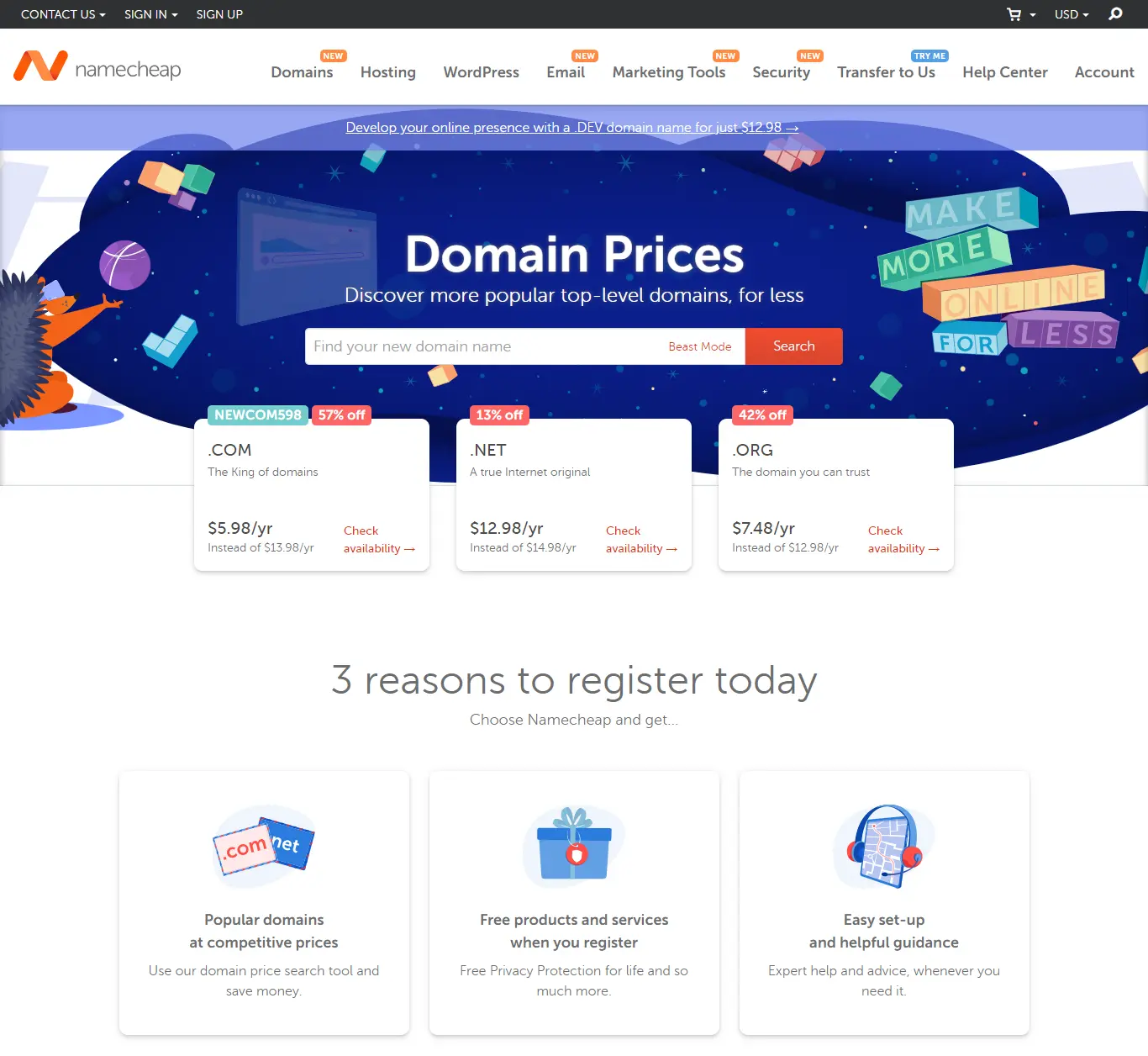
Image Source: Namecheap
Key Features🌟
Now, let’s talk about what sets Namecheap apart from the rest. First up, competitive pricing that won’t leave your wallet feeling light as a feather. Whether you’re a seasoned pro or just dipping your toes into the world of websites, Namecheap offers budget-friendly options that won’t leave you scratching your head over your bank statement. Plus, their user-friendly interface makes it a breeze to register and manage your domains—no tech wizardry required!
Let’s explore some key features of Namecheap, a popular domain registrar
Domain Search Process:
- When you search for a domain using Namecheap’s Domain Name Search, you’ll find information about its availability along with a list of similar domain names you might be interested in.
- The Beast Mode tool allows you to check options for multiple names and apply various filters:
- Choose the desired price range.
- Use the Show Domain Hacks option to find creative domain names that combine domain levels (e.g., inter.net, domain. name).
- Hide unavailable domain names.
- Show premium domains.
- Drop the last vowel in search results (e.g., ocean.name becomes ocen.name).
- Pluralize nouns (e.g., space.net becomes spaces.net).
- Append prefixes or suffixes to your keywords.
- You can register up to 50 domain names at once.
Domain Statuses:
- V (or blank): The domain is available for registration.
- Special: Available at a promotional price.
- Taken: Registered by someone else or reserved by the Registry.
- Premium: Either a premium domain on sale or a high-valued premium domain released for registration.
- Handshake: Part of the Handshake Naming System (HNS), a decentralized approach using blockchain technology for web addresses.
Additional Features:
- Whois Guard: Keep your data safe with domain privacy protection.
- Free Email Address: Enjoy a 2-month free trial.
- Free DNSSEC Security: Protect visitors from fraudulent activity.
Namecheap also offers a user-friendly account panel, bulk management options, and integration with various applications.
Pros and Cons✅🚫
Namecheap is one of the popular domain registrars known for its affordability and user-friendly interface. Here are some pros and cons:
✅Pros:
Namecheap is one of the popular domain registrars known for its affordability and user-friendly interface. Here are some pros and cons:
- Affordable Pricing: Namecheap offers competitive pricing for domain registrations, renewals, and transfers, often lower than many other registrars.
- Free WHOIS Privacy: They provide free WHOIS privacy protection with every domain registration, helping to keep your personal information private.
- User-friendly Interface: The platform is intuitive and easy to navigate, making it simple for users to manage their domains and settings.
- Reliable Customer Support: Namecheap offers customer support through live chat, email, and a knowledge base, assisting with any domain-related issues.
- Freebies and Additional Services: They often include extras such as free email hosting, free DNS management, and discounted hosting services with domain purchases.
- Transparent Pricing: There are no hidden fees, and pricing is transparent, making it easier for users to understand the costs associated with their domains.
🚫Cons:
- Upselling: Some users find that Namecheap can be aggressive with upselling additional services during the checkout process, which can be frustrating.
- Renewal Rates: While the initial registration prices are low, renewal rates may be higher, which could lead to unexpected costs in the long run.
Namecheap is a reliable domain registrar with competitive pricing. While it may not suit complex setups, it’s a solid choice for straightforward hosting needs. Remember to weigh these pros and cons based on your specific requirements! 🌐🔍
Who should use Namecheap?🤔
Namecheap domain registrar is suitable for a variety of individuals and businesses, including:
- Individuals and Hobbyists
- Small Businesses and Startups
- Freelancers and Consultants
- Developers and Tech-Savvy Users
- Bloggers and Content Creators
- Nonprofit Organizations
Overall, Namecheap is a suitable domain registrar for individuals and businesses seeking affordable, reliable, and user-friendly domain registration services with added features and support.
Pricing Details💰
Now, let’s talk dollars and cents. One of the biggest draws of Namecheap is its competitive pricing. It’s like finding a designer handbag at a thrift store—you’re getting top-notch quality without the hefty price tag.
Price List of Various Domain Names:
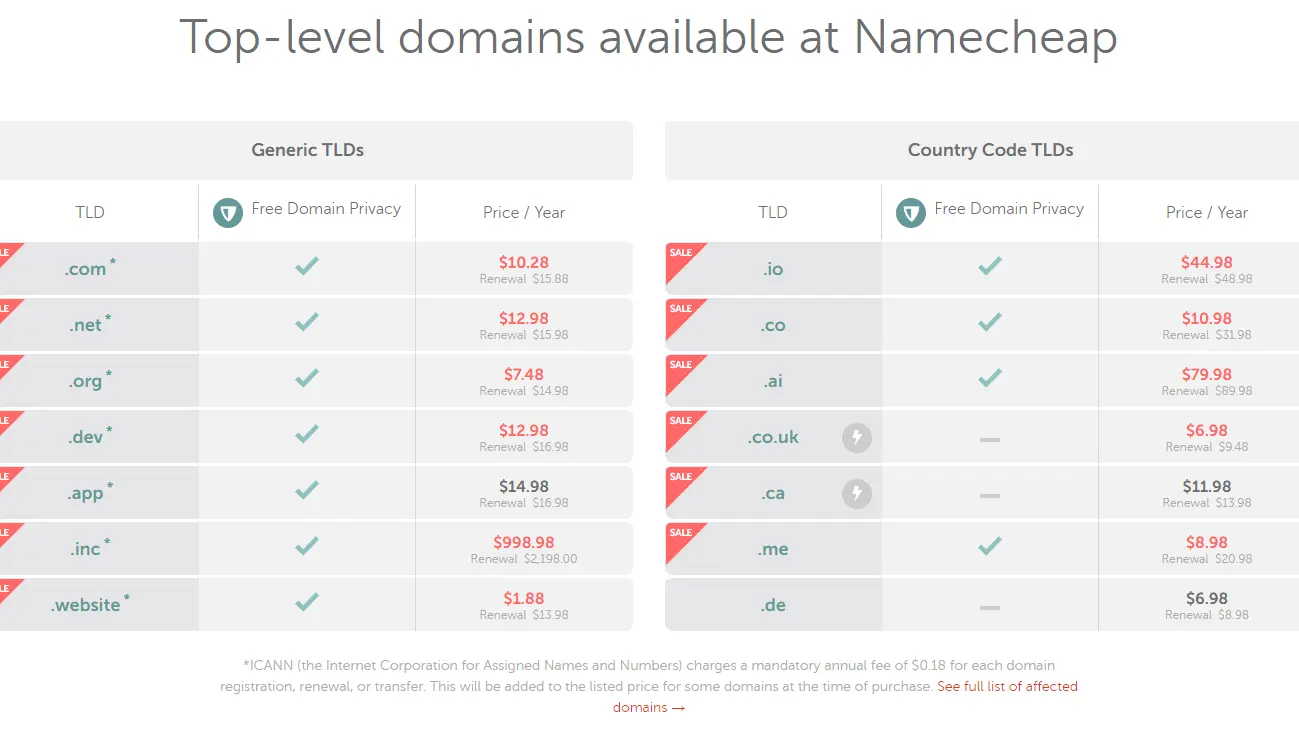
Image Source: Namecheap
Note: To see the full list of affected domains, please visit the Namecheap Domains Page.
But here’s the best part – Namecheap doesn’t play hide-and-seek with its renewal rates. Unlike some other registrars that sneak in hidden fees when it’s time to renew, Namecheap keeps things transparent. You’ll know exactly how much you’ll be paying upfront, so you can budget accordingly. It’s like having a trustworthy friend who always keeps their promises.
GoDaddy: The All-In-One Domain Management Platform
Ah, GoDaddy—the household name in the world of domain registrars. If you’re looking for a one-stop for all your domain needs, you’ve come to the right place. GoDaddy is like the bustling marketplace of the internet, bustling with options and opportunities to claim your piece of the digital pie.
Let’s dive into the world of GoDaddy and explore why it’s considered an all-in-one domain management platform!
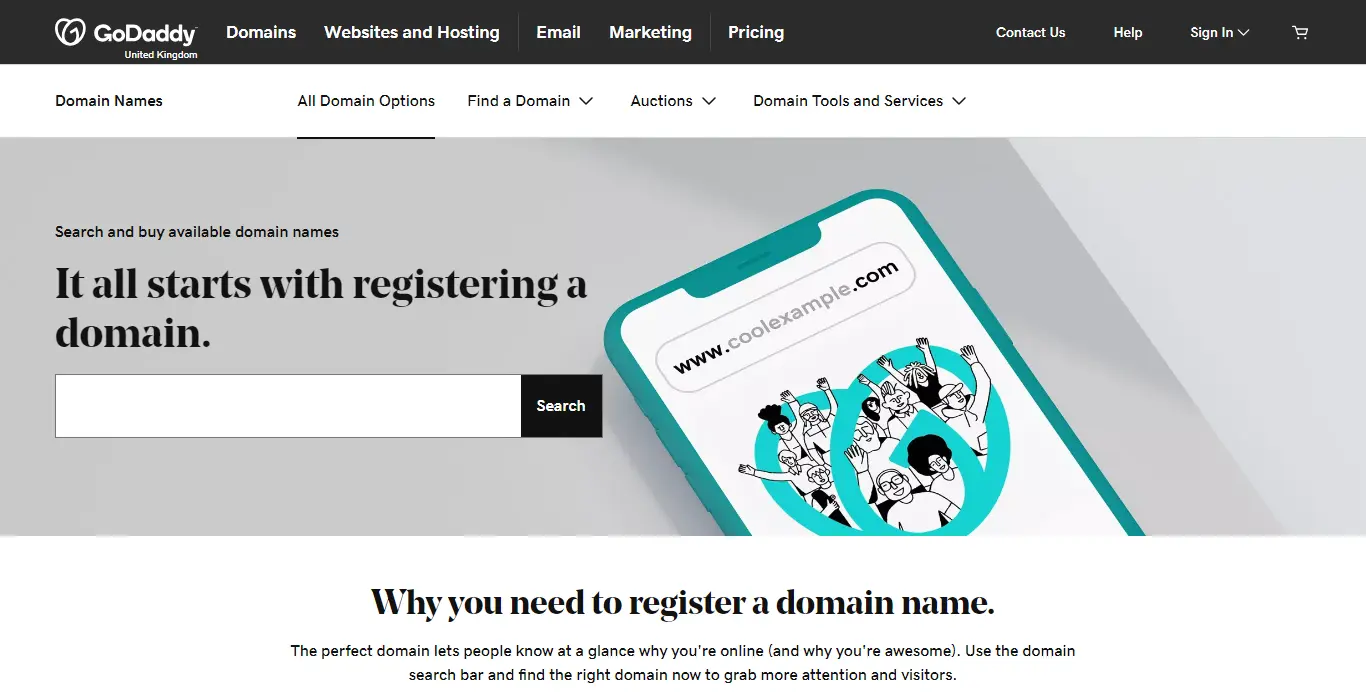
Image Source
Key Features🌟
- Domain Registration: GoDaddy allows you to register new domains, transfer existing domains, and manage all your domains in one place.
- Wide Range of TLDs: They offer a wide variety of top-level domains (TLDs), including traditional options like .com, .net, and .org, as well as newer options like .io, .co, and many more.
- Additional Services: In addition to domain registration, GoDaddy offers various supplementary services like web hosting, website builders, email hosting, SSL certificates, and more, making it a one-stop solution for individuals and businesses looking to establish an online presence.
- Domain Management Tools: GoDaddy provides easy-to-use tools for managing DNS settings, domain forwarding, privacy protection, and other domain-related tasks through their intuitive control panel.
- Customer Support: They offer 24/7 customer support via phone, live chat, and email, ensuring assistance is available whenever you need it.
Pros and Cons✅🚫
✅Pros:
- User-Friendly Interface: GoDaddy’s interface is designed to be user-friendly, making it easy for beginners to register and manage domains without technical expertise.
- Affordability: They often run promotions and discounts, making domain registration and other services more affordable, especially for new customers.
- Reliability: GoDaddy is a well-established company with a strong reputation for reliability and uptime, ensuring your domains remain accessible.
- Additional Services: Their extensive range of additional services allows customers to conveniently manage various aspects of their online presence in one place.
🚫Cons:
- Upselling: Some users find GoDaddy’s upselling tactics aggressive, with numerous add-ons and services presented during the checkout process, which can be overwhelming for those looking for a simple domain registration.
- Renewal Prices: While GoDaddy’s initial registration prices can be competitive, renewal prices for domains and services tend to be higher, potentially leading to unexpected expenses in the long term.
Pricing Details💰
When it comes to pricing, GoDaddy offers competitive rates on domain registration, with occasional discounts and promotions to sweeten the deal. Plus, their transparent renewal rates mean you won’t be caught off guard when it’s time to renew your domain. It’s like getting a good deal at your favorite store – you know exactly what you’re paying for, with no hidden fees or surprises.
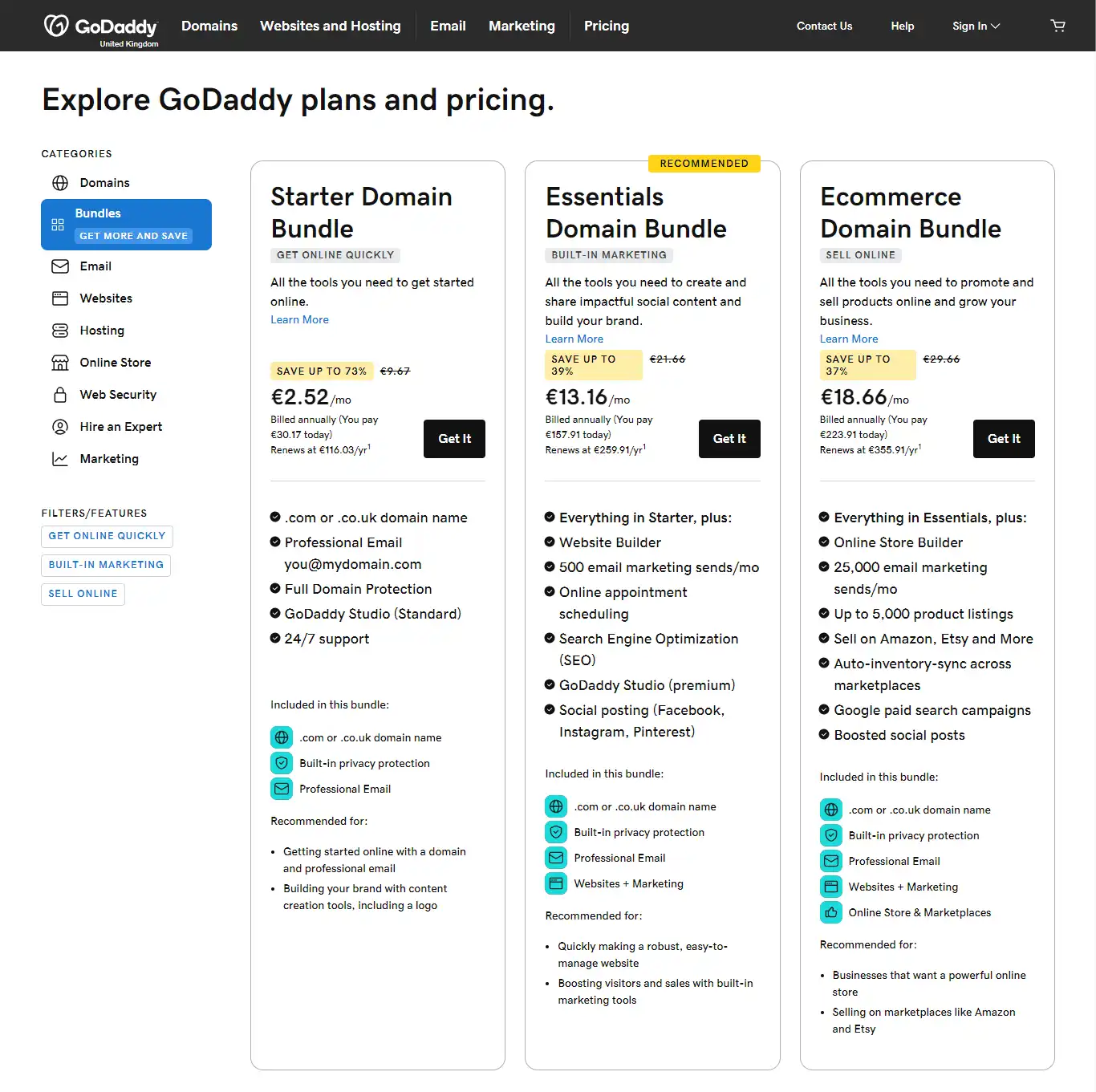
Image Source: GoDaddy
And there you have it— a closer look at GoDaddy, the all-in-one domain management platform. With its vast selection of domain extensions, key features, competitive pricing, and transparent renewal rates, GoDaddy is a top contender in the world of domain registrars. So why wait? Head on over to GoDaddy and kickstart your online journey today!
Hostinger: Seamless Domain Solutions
Ah, Hostinger—the unsung hero of domain registrars. If you’re in the market for hassle-free domain solutions, look no further. Hostinger is like the friendly neighbor who always has your back, offering seamless domain setup and management with a smile. Whether you’re a seasoned pro or a newbie to the online world, Hostinger makes it easy to claim your piece of the internet pie.
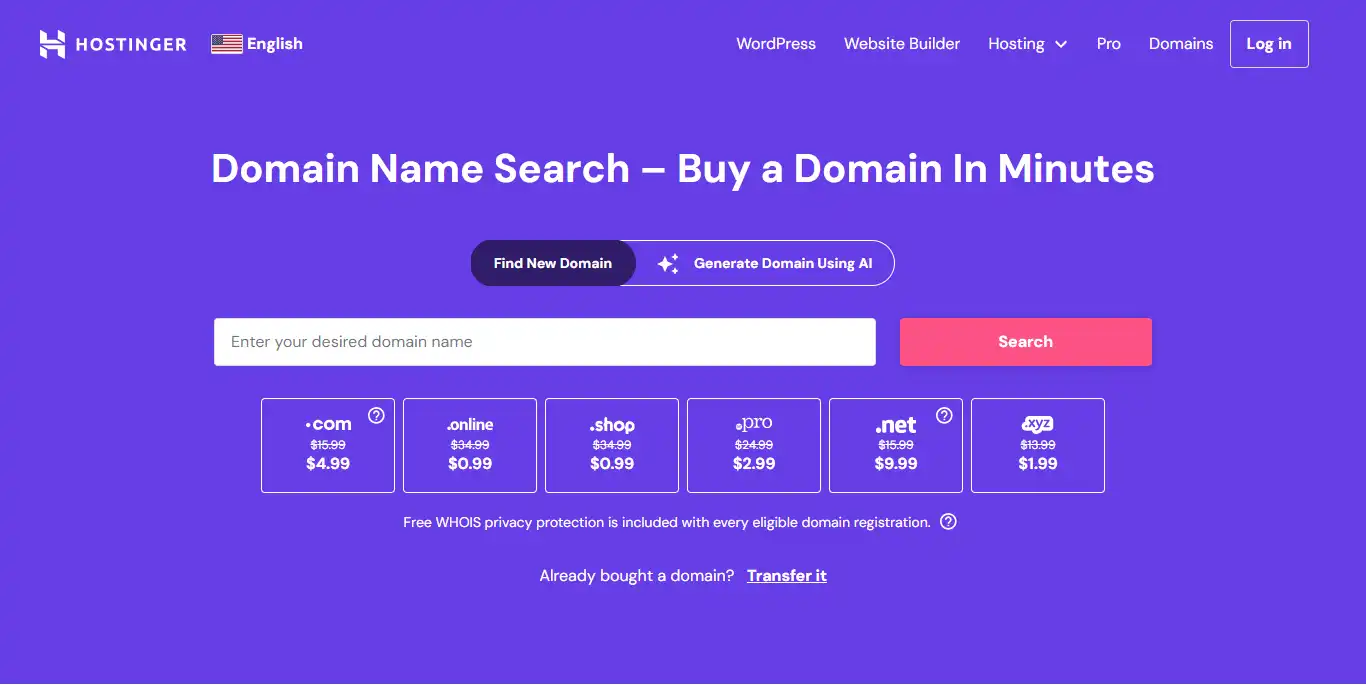
Image Source: Hostinger
Key Features🌟
Key features of Hostinger Name Domain Registrar typically include:
- Domain Registration: Hostinger allows you to register various top-level domains (TLDs) such as .com, .net, .org, .info, .biz, .online, .store, etc.
- Domain Transfer: Hostinger often provides tools and assistance for transferring existing domains from other registrars to their platforms.
- DNS Management: Hostinger typically offers a user-friendly interface for managing Domain Name System (DNS) settings, allowing you to control DNS records like A, MX, CNAME, TXT, etc.
- WHOIS Privacy Protection: Many domain registrars, including Hostinger, offer WHOIS privacy protection services to keep your personal information private and secure from public access.
- Domain Forwarding: Hostinger may allow you to forward your domain to another URL or website, ensuring seamless redirection.
- Domain Renewal and Auto-Renewal: Hostinger usually provides options for easy domain renewal and often offers auto-renewal services to ensure your domain stays active.
- Domain Parking: Some domain registrars, including Hostinger, offer domain parking services where you can display a placeholder webpage until you’re ready to use the domain.
- Email Forwarding: Hostinger might provide email forwarding features, allowing you to create custom email addresses and forward emails to your primary inbox.
- Domain Management Dashboard: Hostinger typically provides a user-friendly dashboard where you can manage all aspects of your domain, including registration, renewal, DNS settings, and more.
- 24/7 Customer Support: Hostinger generally offers customer support services to assist with any domain-related issues or inquiries.
Pros and Cons✅🚫
Here are some potential pros and cons of using Hostinger as your domain registrar:
✅Pros:
- Affordability: Hostinger often offers competitive pricing for domain registration services, making it an attractive option for individuals and small businesses on a budget.
- User-Friendly Interface: Hostinger typically provides a user-friendly interface for managing domains, making it easy for beginners to register, transfer, and manage their domains.
- DNS Management: Hostinger usually offers robust DNS management tools, allowing you to easily configure DNS records and make necessary changes.
- WHOIS Privacy Protection: Hostinger may offer WHOIS privacy protection services to keep your personal information private and secure from public access, helping to prevent spam and unwanted solicitations.
- Customer Support: Hostinger generally provides 24/7 customer support to assist with any domain-related issues or inquiries you may have.
🚫Cons:
- Limited TLD Options: While Hostinger offers a variety of top-level domains (TLDs), they may not have as extensive a selection as some other registrars. If you’re looking for a specific or less common TLD, you may need to check if Hostinger supports it.
- Upselling: Like many domain registrars, Hostinger may engage in upselling additional services during the registration process, which could potentially increase the overall cost of your domain registration.
Pricing Details💰
When it comes to pricing, Hostinger is like the budget-friendly option without sacrificing quality. They offer competitive pricing, ensuring you won’t be hit with any surprises down the line. Plus, with their affordable rates, Hostinger makes it easy to get started without breaking the bank. It’s like getting a great deal at your favorite store—you can shop with confidence knowing you’re getting the best bang for your buck.
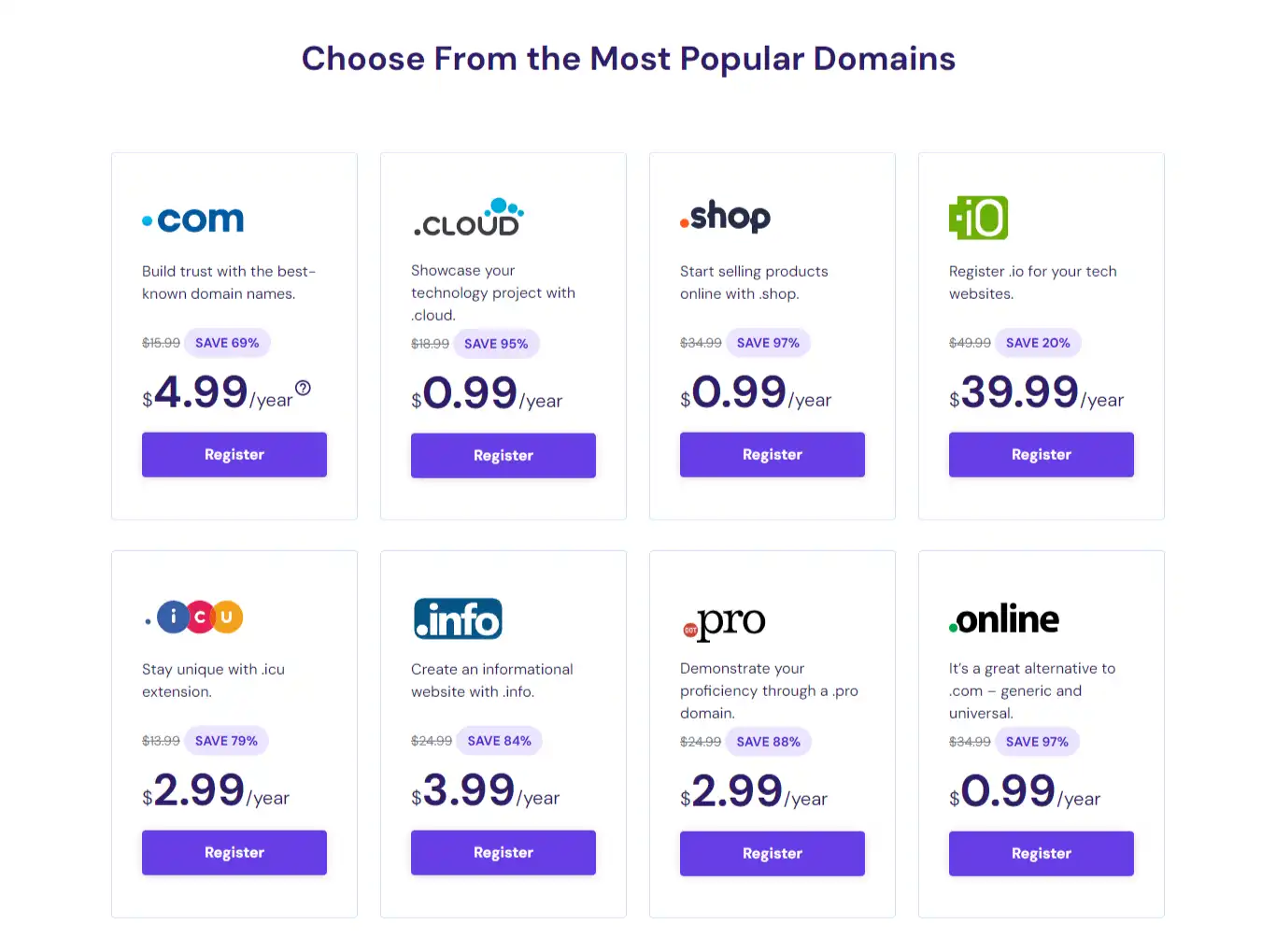
Image Source: Hostinger
In summary, that’s it, my friend, A closer look at Hostinger and its seamless domain solutions. With key features, pros and cons, transparent pricing, and no hidden fees, Hostinger is a top choice in the world of domain registrars. So why wait? Head on over to Hostinger and take the first step towards building your online empire today!
Bluehost: Where Hosting and Domains Converge
Picture this: You’re embarking on your online journey, and you need a reliable partner to guide you through the digital wilderness. That’s where Bluehost comes in. As one of the best domain registrars out there, Bluehost is like your trusty sidekick, offering seamless integration of hosting and domain services. It’s your one-stop shop for all things website-related, making it easier than ever to bring your online dreams to life.

Image Source: Bluehost
Key Features🌟
Here are some key features of Bluehost’s domain registrar:
- Domain Registration: Bluehost allows you to register new domain names directly through their platform. They offer a variety of domain extensions (TLDs) such as .com, .net, .org, .info, and many others.
- Domain Transfer: You can transfer existing domains to Bluehost for management. This service helps consolidate domain management tasks under one provider.
- Domain Management Tools: Bluehost provides a user-friendly interface for managing domain settings. This includes DNS management, domain forwarding, domain locking, and WHOIS privacy settings.
- Domain Renewal: Bluehost offers automatic domain renewal options to ensure that you do not lose ownership of their domain names due to expiration.
- WHOIS Privacy Protection: Bluehost typically offers WHOIS privacy protection as an optional service for an additional fee. This feature helps protect the personal information of domain owners by replacing it with Bluehost’s contact information in the WHOIS database.
- Domain Hosting Integration: Bluehost seamlessly integrates domain registration with their web hosting services, making it easy for users to set up websites and manage domains from a single platform.
- Customer Support: Bluehost provides customer support for domain-related issues, including assistance with domain transfers, DNS configuration, and troubleshooting.
- Affordable Pricing: Bluehost’s domain registration services often come with competitive pricing, especially for the first year of registration. However, prices may vary depending on the domain extension.
- Additional Services: Bluehost may offer additional services such as email hosting, SSL certificates, website builders, and security features that complement domain registration and web hosting needs.
Pros and Cons✅🚫
Here are some pros and cons of using Bluehost as a domain registrar:
✅Pros:
- Integration with Hosting: If you’re using Bluehost as your web hosting provider, having your domain registered with them can streamline management tasks. Integration often means easier DNS configuration and billing consolidation.
- User-Friendly Interface: Bluehost provides a user-friendly interface for managing domains. This can be especially helpful for beginners or those who prefer a straightforward management experience.
- Reliability: Bluehost is a well-established company with a solid reputation in the web hosting industry. Their domain registration services benefit from the same reliability and infrastructure.
- Customer Support: Bluehost offers customer support for domain-related issues, which can be valuable if you encounter any difficulties with your domain settings or configurations.
- WHOIS Privacy Protection: Bluehost typically offers WHOIS privacy protection as an optional service. This can help protect your personal information from being publicly accessible in the WHOIS database.
🚫Cons:
- Limited Domain Extensions: While Bluehost offers a variety of domain extensions, their selection may not be as extensive as some specialized domain registrars. If you’re looking for less common or country-specific extensions, you might find better options elsewhere.
- Renewal Pricing: While Bluehost may offer competitive pricing for initial domain registration, renewal prices could be higher. It’s essential to review renewal pricing before committing to a domain registration to avoid unexpected costs down the line.
- Upselling: Like many domain registrars, Bluehost may engage in upselling additional services during the registration process. While some of these services may be beneficial, others may not be necessary for your needs.
Pricing Details💰
Bluehost offers competitive pricing. Whether you’re just starting out with a small personal blog or running a bustling e-commerce empire, Bluehost has a plan for you.
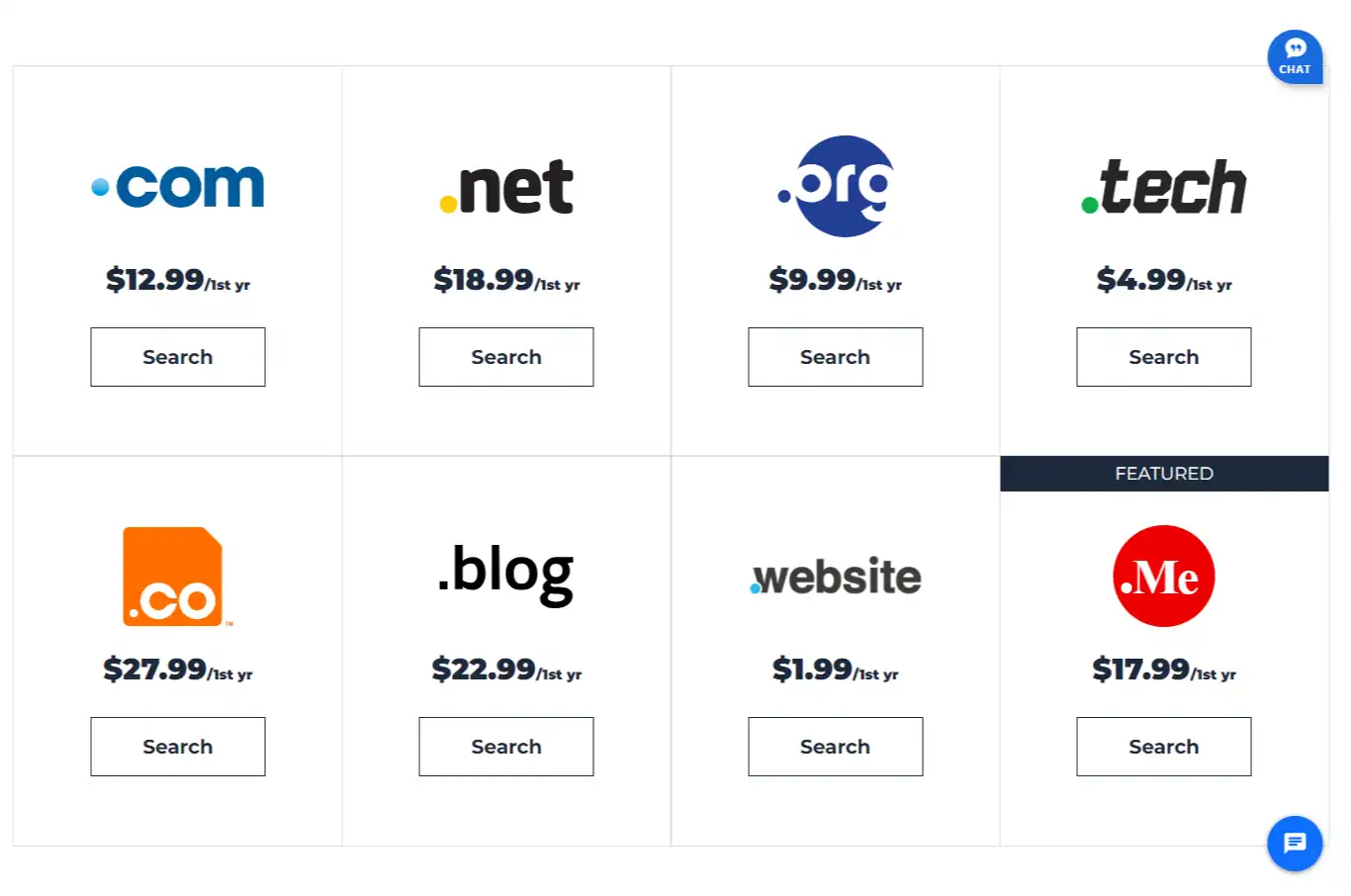
Image Source: Bluehost
Overall, whether Bluehost’s domain registrar is the right choice for you depends on your specific needs, preferences, and priorities. It’s essential to weigh these pros and cons against alternatives to make an informed decision.
NameSilo: Simplicity and Affordability Combined
NameSilo isn’t your typical domain registrar. It’s like that friendly neighbor who always has a smile and a great deal to offer. Imagine strolling into a cozy little shop where the sign outside reads, “Domain Names: Freshly Picked Daily!”
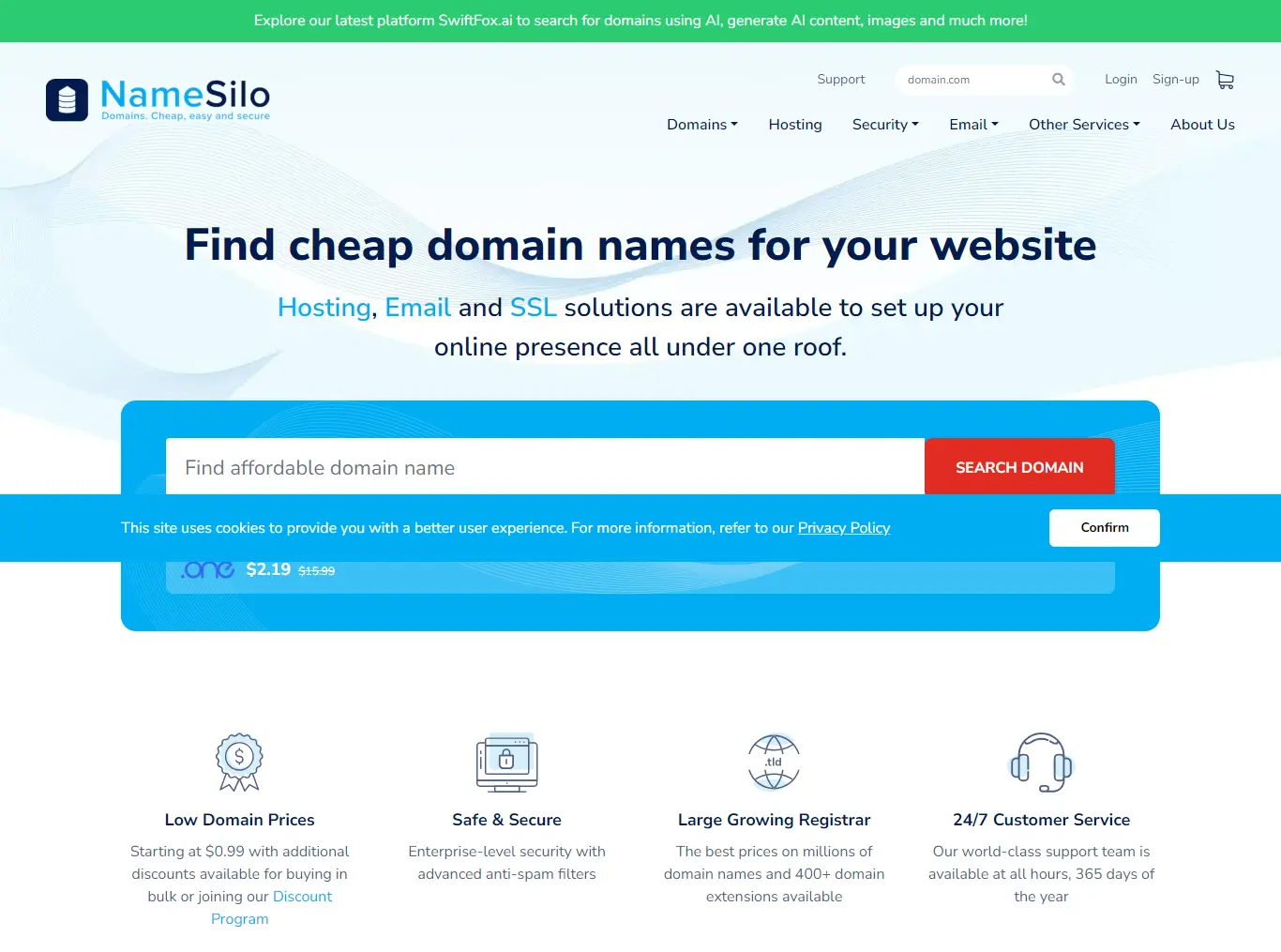
Image Source: NameSilo
So, what’s the buzz about NameSilo? Well, it’s an ICANN-accredited registrar (fancy term, but stick with me) based in sunny Phoenix, Arizona. They’ve been at this game since 2010 and have wrangled over 3 million active domain names—that’s like having a whole orchard of digital real estate!
Now, let’s break it down:
Key Features🌟
Here are some key features of NameSilo:
- Competitive Pricing: NameSilo is known for its affordable pricing, often offering domains at lower rates compared to many other registrars. They also provide transparent pricing with no hidden fees.
- Free WHOIS Privacy: NameSilo includes WHOIS privacy protection for free with every domain registration. This feature helps keep personal information private and reduces the risk of spam and identity theft.
- Easy Domain Management: The NameSilo platform offers a user-friendly interface for managing domains. Users can easily register, transfer, renew, and update their domain settings through the intuitive dashboard.
- Bulk Management Tools: NameSilo provides tools for the bulk management of domains, allowing users to make changes to multiple domains simultaneously. This feature simplifies tasks such as renewals, DNS updates, and contact information changes for users with large domain portfolios.
- Security Features: NameSilo prioritizes security and offers features such as two-factor authentication (2FA) to enhance account security. Users can enable 2FA to add an extra layer of protection to their accounts.
- DNS Management: NameSilo allows users to manage their domain’s DNS settings easily. Users can configure DNS records, set up custom DNS templates, and manage domain forwarding directly from the NameSilo dashboard.
- Additional Services: In addition to domain registration, NameSilo offers additional services such as SSL certificates, email forwarding, and website hosting. This allows users to manage all aspects of their online presence from a single platform.
- Responsive Customer Support: NameSilo provides customer support via email and live chat. Their support team is known for being responsive and helpful, assisting users with any questions or issues they may encounter.
- Domain Marketplace: NameSilo operates a domain marketplace where users can buy and sell domain names. This feature provides users with an additional avenue for acquiring or disposing of domain assets.
- API Access: NameSilo offers an API that allows developers to integrate domain management functionality into their applications or websites. This API access enables automation and customization of domain management processes.
Pros and Cons✅🚫
Here are some pros and cons of using NameSilo as a domain registrar:
✅Pros:
- Competitive Pricing: NameSilo offers some of the lowest prices for domain registrations in the industry. They often provide promotions and discounts, and there are no hidden fees.
- Free WHOIS Privacy: WHOIS privacy protection is included for free with every domain registration, helping to keep personal information private and reducing spam.
- User-Friendly Interface: NameSilo’s platform is intuitive and easy to use, making it simple for beginners to register and manage domains.
- Back-Ordering Capability: If you desire a specific domain that’s currently unavailable, NameSilo allows you to back-order it.
- Recall Domain Search History: Conveniently revisit your previous domain searches.
- Highly Rated Customer Support: NameSilo is praised for its responsive and helpful customer service.
🚫Cons:
- Expensive Renewal for Some Extensions: While .com domains remain affordable, certain extensions (e.g., .co) can be pricey at $24.99 per year upon renewal.
- Limited Hosting Options: While NameSilo does offer website hosting, their hosting options may not be as robust or feature-rich as some other hosting providers in the market.
Pricing Details💰
NameSilo keeps it simple: domain prices are transparent, like a crystal-clear stream. And guess what? Add-ons like WHOIS privacy, email forwarding, and domain defender protection? All freebies! 🎁
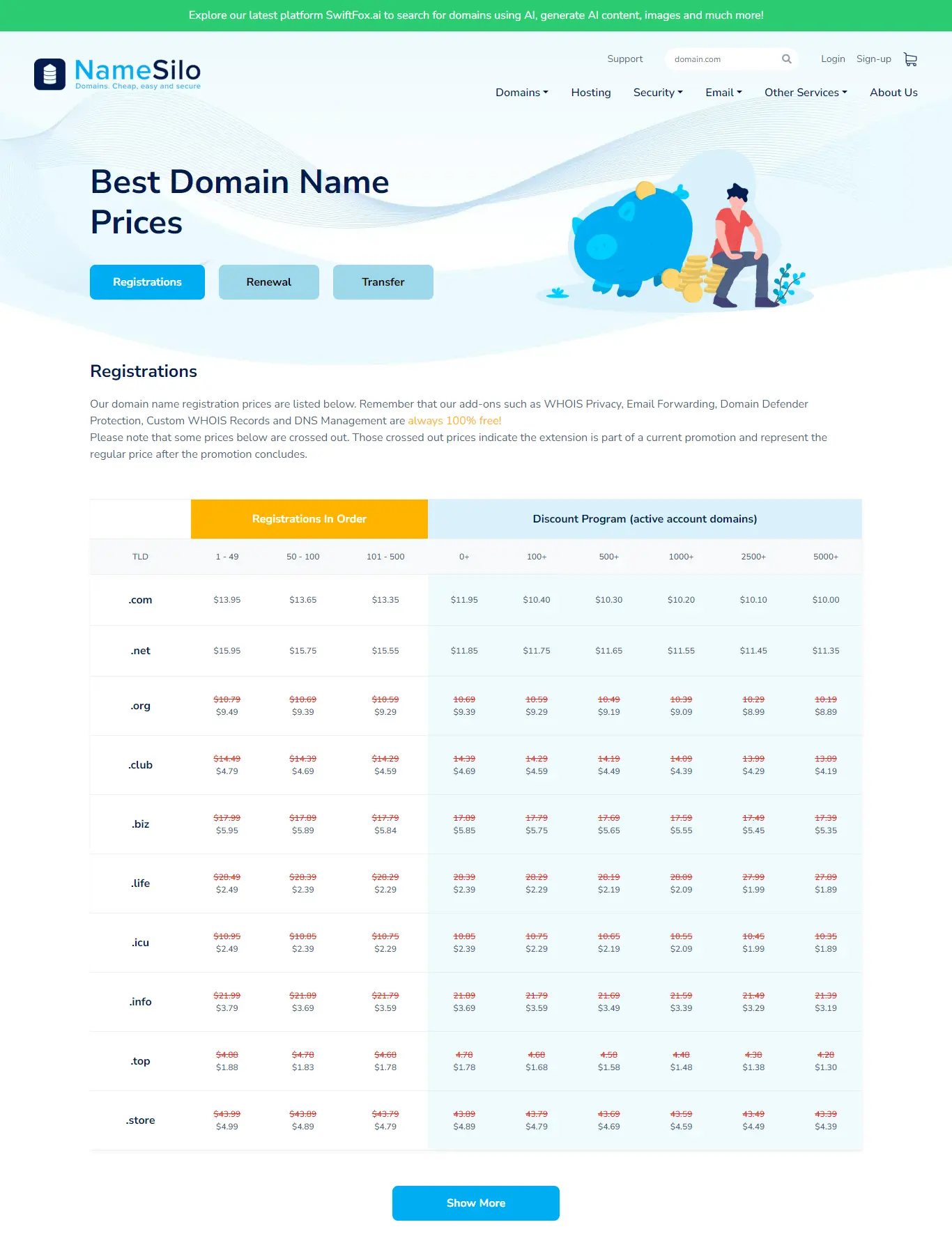
Image Source
Note: For more details about pricing, please visit the NameSilo Pricing Page.
With NameSilo by your side, claiming your spot in the digital realm becomes a breeze. So, fellow adventurers, buckle up and get ready to embark on a journey filled with simplicity, affordability, and endless possibilities with NameSilo – truly one of the Best Domain Registrars of 2024.
What Is the Cost of a Domain Name?
Hey there! So, you’re on the hunt for the perfect domain name, huh? Well, let’s talk turkey about what it’s gonna cost you.
Alright, so first off, there’s no one-size-fits-all answer here. It’s like shopping for shoes—you’ve got all kinds of options, and the price can vary big time depending on what you’re after. On average, you’re looking at about $10 to $50 a year, but hold onto your hats because some names can cost you a pretty penny—like, in the thousands!
Price influencing factors
Now, why the price difference? Well, think of it this way: your domain is like a little plot of land in cyberspace. The extension you pick (you know, .com, .net, .org, etc.), how popular the name is, and which registrar you go with all play a role.
Let’s break it down a bit more:
- Extension Matters: .com domains tend to be the big shots, so they often come with a higher price tag. But don’t sleep on those lesser-known extensions like .net or .org—they can save you a few bucks.
- Popularity Contest: Just like scoring front-row seats to a concert, if a domain name is super popular and in high demand, you might need to break out the big bucks.
- Premium Picks: Ever heard of VIP treatment? Well, some domains are like that—they’re considered “premium” because they’re top-notch, and you’ll pay extra for them.
- Registrar Roulette: Each registrar sets its own prices, so it’s worth poking around. You might find lower upfront costs, but watch out for sneaky renewal fees or extra charges.
Hidden Charges
But wait, there’s more! Watch out for hidden charges lurking in the shadows:
- Renewal Fees: Some registrars may offer very low introductory rates for the first year of domain registration but then significantly increase the price upon renewal. Make sure to check the renewal fees before registering a domain.
- Transfer Fees: If you decide to transfer your domain to another registrar, there might be transfer fees involved. Ensure you understand these fees before initiating a transfer.
- Privacy Protection: Privacy protection services, also known as WHOIS privacy, can shield your personal information from public view in the WHOIS database. Some registrars offer this service for an additional fee.
- Email Forwarding: If you want email forwarding services associated with your domain, some registrars may charge extra for this feature.
- Domain Parking: Parking your domain (keeping it registered but not associating it with a website or email service) might incur additional fees with certain registrars.
- Add-on Services: Registrars may offer various add-on services, such as SSL certificates, website builders, or hosting packages, which could involve additional costs.
- Premium Domain Names: Premium domain names, which are often shorter or contain popular keywords, may come with significantly higher registration fees.
Always carefully read the terms of service and pricing details provided by the registrar to understand any potential hidden charges associated with domain registration. It’s also a good idea to research and compare different registrars to find the best combination of services and pricing for your needs.
So, when it comes to choosing the best domain registrars, remember to look beyond the sticker price and watch out for those sneaky fees!
Importance of WHOIS Privacy
WHOIS privacy refers to the practice of masking or hiding the personal contact information of domain owners in the WHOIS database, which is a publicly accessible repository containing domain registration details. Here are several reasons why WHOIS privacy is important:
- Protection from Spam: Without WHOIS privacy, domain owners’ personal contact information such as email addresses and phone numbers are easily accessible to spammers who can use this information for unsolicited emails, calls, or other forms of spam.
- Prevention of Identity Theft: Publicly available WHOIS data can expose domain owners to identity theft and fraud. Hackers or malicious actors can misuse this information to impersonate domain owners, potentially causing financial or reputational harm.
- Enhanced Security: Concealing personal contact details helps protect domain owners from targeted attacks, such as phishing scams or hacking attempts. With WHOIS privacy, it becomes more challenging for attackers to gather the necessary information to launch such attacks.
- Privacy Rights: Domain owners have a right to privacy regarding their personal information. WHOIS privacy ensures that individuals and businesses can maintain their privacy online without having their personal details readily accessible to anyone who searches for their domain.
- Avoidance of Unwanted Solicitations: Without WHOIS privacy, domain owners may receive unsolicited marketing or sales pitches from businesses that scrape WHOIS data to identify potential customers. WHOIS privacy helps reduce such unwanted solicitations.
- Protection for Individuals and Small Businesses: Individuals and small businesses, in particular, may not have the resources or expertise to adequately secure their online presence. WHOIS privacy offers an additional layer of protection for these entities, helping them safeguard their personal information and online assets.
- Compliance with Data Protection Regulations: In many jurisdictions, there are regulations governing the collection, storage, and processing of personal data. WHOIS privacy helps domain owners comply with these regulations by limiting the exposure of their personal information.
Overall, WHOIS privacy plays a crucial role in safeguarding the privacy, security, and rights of domain owners in an increasingly digital world.
How To Choose a Domain Name: Best Practices
Choosing a domain name is an important decision, as it represents your online identity and brand. Here are some steps to help you choose a domain name:
- Relevance: Your domain name should be relevant to your website’s content, purpose, or brand. It should give visitors an idea of what to expect when they visit your site.
- Keep it Simple: Aim for a domain name that is easy to remember, spell, and type. Avoid using hyphens, numbers, or complicated spellings that could confuse users.
- Short and Sweet: Shorter domain names are easier to remember and type. Try to keep your domain name concise while still conveying your message.
- Consider Hyphen: While generally it’s best to avoid hyphens, in some cases, it might be necessary for clarity, especially if your desired domain name without hyphens is already taken. However, use hyphens sparingly as they can make the domain name harder to remember and type.
- Use Keywords: Incorporating relevant keywords into your domain name can help improve search engine optimization (SEO) and make it easier for users to find your website.
- Avoid Trademark Issues: Make sure your domain name does not infringe on any existing trademarks. You can search trademark databases to ensure your chosen domain name is available.
- Consider Your Audience: Think about your target audience and what they might expect from your domain name. Choose a name that resonates with your audience and reflects your brand identity.
- Research Availability: Use domain name search tools provided by domain registrars to check the availability of your desired domain name. Be prepared with alternative options in case your first choice is already taken.
- Choose the Right TLD: Selecting the appropriate top-level domain (TLD) extension (.com, .net, .org, etc.) can impact how users perceive your website. Consider using a TLD that is commonly associated with your industry or location.
- Brandable: Aim for a domain name that is unique and brandable. Your domain name should stand out and leave a positive impression on visitors.
- Future-proofing: Consider the long-term implications of your domain name. Will it still be relevant and meaningful as your business grows and evolves?
- Social Media Availability: Check the availability of your chosen domain name on social media platforms to ensure consistency across your online presence.
By following these steps and carefully considering your options, you can choose a domain name that effectively represents your brand and helps you achieve your online goals.
TLD (.com, .net, .org) vs. Other Domain Extensions
So, you’re ready to stake your claim on the internet with a shiny new domain name. But wait – should you go for the tried-and-true TLDs like .com, .net, and .org, or venture into the world of funky new extensions like .ninja or .xyz? Let’s unravel this mystery together!
What are TLDs?
Let’s start with the basics. TLD stands for Top-Level Domain, and they’re the OGs of the internet. Think of them as the main streets of a bustling city – familiar, reliable, and always bustling with activity. The most common TLDs include .com, .net, and .org, and they’re like the holy trinity of domain extensions. They’re universally recognized and trusted by internet users worldwide.
The Classic Trio: .com, .net, .org
Ah, the holy trinity of domain extensions – .com, .net, and .org. These babies have been around since the dawn of the internet, and they’re like the gold standard of domain names. Think of them as the main streets of a bustling city – familiar, reliable, and always bustling with activity. They’re universally recognized and trusted by internet users worldwide, making them the go-to choice for businesses, organizations, and individuals alike.
The Allure of .com
Ah, the legendary .com – the undisputed king of domain extensions. It’s like the prime real estate of the internet, coveted by businesses and individuals alike. When you think of a website, chances are it ends in .com. It’s like having a storefront on the busiest street in town – everyone knows where to find you, and you exude credibility and authority.
Exploring New Horizons with Other Extensions
But what about the newcomers on the block, like .ninja, .xyz, or .io? These funky extensions are like the trendy neighborhoods of the internet – quirky, creative, and full of character. They offer a fresh alternative to the traditional TLDs and can help your website stand out in a sea of .coms. Whether you’re a tech-savvy startup, a creative freelancer, or a blogging guru, there’s a unique extension out there just waiting for you to claim it.
Finding the Perfect Fit
So, which option is right for you – TLD or other extensions? It ultimately depends on your brand identity, target audience, and the message you want to convey. If you’re aiming for mass appeal and universal recognition, you can’t go wrong with a classic .com. But if you’re looking to make a bold statement and carve out your own corner of the internet, a quirky new extension might be just what you need.
Embracing Diversity
At the end of the day, the beauty of the internet lies in its diversity. Whether you choose a classic TLD or a trendy new extension, what matters most is that your domain reflects your unique identity and resonates with your audience. So go ahead, unleash your creativity, and let your domain be the ultimate expression of who you are and what you stand for in the vast digital landscape.
Choosing between TLDs and other domain extensions is like deciding between a classic suit and a funky outfit; both have their own appeal, and it ultimately comes down to personal preference and style. So go ahead, explore your options, and claim your spot on the internet with a domain that speaks volumes about you and your brand!
Some Common Domain Name Mistakes
Here are some common mistakes to avoid when choosing a domain name:
- Choosing a Complex or Confusing Name: Opting for a domain name that is difficult to spell, pronounce, or remember can make it challenging for users to find and remember your website.
- Using Numbers and Hyphens: Including numbers or hyphens in your domain name can lead to confusion. It can be difficult for users to remember whether to spell out the number or use the numeral, and hyphens can make your domain name harder to type and less visually appealing.
- Ignoring SEO: Neglecting to include relevant keywords in your domain name can hinder your website’s search engine optimization (SEO) efforts. Choose a domain name that reflects your content and incorporates keywords that users might search for.
- Ignoring Branding: Your domain name is a critical part of your brand identity. Avoid choosing a domain name that conflicts with your brand or fails to convey the right message to your target audience.
- Copying Others: Attempting to imitate or replicate another company’s domain name can lead to confusion and legal issues. Aim for a unique and original domain name that sets your brand apart.
- Not Checking Trademarks: Failing to research existing trademarks before registering a domain name can result in legal issues down the line. Make sure your chosen domain name does not infringe on any existing trademarks.
- Choosing a Limiting Name: Selecting a domain name that is too specific to your current offerings or location can limit your ability to expand or pivot your business in the future.
- Ignoring Social Media Availability: Check the availability of your chosen domain name on social media platforms to ensure consistency across your online presence. A domain name that is unavailable or already in use on social media can make it harder for users to find and connect with your brand.
- Ignoring Domain Extensions: While .com is the most popular domain extension, consider other options that might be more relevant to your industry or location. However, avoid obscure or less common extensions that could confuse users.
- Failing to Renew on Time: Forgetting to renew your domain name before it expires can result in your website becoming inaccessible and potentially losing ownership of your domain name.
By avoiding these common mistakes and carefully considering your options, you can choose a domain name that effectively represents your brand and helps you achieve your online goals.
Additional Tips for Domain Name Registration
Let’s cover some essential tips to ensure a smooth experience in the vast sea of domain registration!
So, you’ve chosen your domain registrar, and you’re ready to claim your piece of the internet pie. But before you hit that “register” button, here are a few extra tips to help you navigate the process like a pro.
Choosing the Right Domain Extension
When it comes to domain extensions, it’s like picking the perfect outfit for a special occasion – you want it to reflect your style and make a statement. Consider what message you want your domain to convey. Are you a business aiming for professionalism with a .com? Or maybe you’re a nonprofit organization looking for credibility with a .org? Whatever your goals, choose a domain extension that aligns with your brand identity and resonates with your audience.
Protecting Your Domain with Privacy Protection
Privacy is paramount in the digital age, and your domain name is no exception. When you register a domain, your personal information – like your name, address, and email – is publicly accessible through the WHOIS database. But don’t fret – many registrars offer privacy protection services to shield your sensitive data from prying eyes. It’s like having a cloak of invisibility for your domain, keeping your personal information safe and secure.
Renewing Your Domain on Time
Imagine this: you’ve built a thriving online presence with your domain name, but one day you wake up to find it has expired. Disaster, right? That’s why it’s crucial to renew your domain on time, just like paying your rent or bills. Set up auto-renewal with your registrar to ensure your domain stays active without any interruptions. It’s like putting your domain on autopilot, so you can focus on what matters most – growing your online empire.
Exploring Additional Services for Website Security and Optimization
Securing your domain is just the first step in building a successful online presence. Consider exploring additional services offered by your registrar to enhance your website’s security and performance. From SSL certificates to protect your visitors’ data to website optimization tools to boost your search engine rankings, these extras can take your website to the next level. It’s like adding the finishing touches to your masterpiece—the little details that make all the difference.
And there you have it—some extra tips to ensure a smooth and successful journey in the world of domain registration. By choosing the right extension, protecting your privacy, renewing your domain on time, and exploring additional services, you’ll be well-equipped to conquer the digital landscape and make your mark on the web. So go ahead, claim your domain, and let your online adventure begin!
Final Words:
Alright, folks, we’ve reached the end of our journey through the wild world of domain registrars, and what a ride it’s been! Let’s take a quick stroll down memory lane and recap the top contenders that made it onto our list of the 5 Best Domain Registrars of 2024.
Let’s quickly recap our top picks:
- Namecheap: Your go-to solution for affordable domain registration with stellar customer support.
- GoDaddy: The all-in-one platform offering a vast selection of domain extensions and robust hosting services.
- Hostinger: It provides reliability and uptime guarantee with seamless Domain Solutions
- Bluehost: Where hosting and domains converge, providing reliable hosting solutions and seamless integration.
- NameSilo: Simple and affordable domain management with free WHOIS privacy protection and bulk management options.
Choosing the best domain registrars is like picking the perfect partner for your online journey. It’s not just about the features and pricing; it’s about finding a registrar that aligns with your goals, values, and vision for the future. Whether you’re a budding entrepreneur, a seasoned blogger, or a small business owner, the right registrar can make all the difference in your online success.
As you embark on this journey, remember the importance of securing your domain name’s future. Your domain is more than just a web address; it’s your digital identity, your online storefront, and your ticket to success in the vast digital landscape. So choose wisely, invest in a registrar that has your back, and watch your online presence flourish.
We hope this guide has empowered you to make an informed decision and set sail on your digital adventure with confidence. But hey, we’re not done yet – we want to hear from you! Drop a comment in the box below and share your thoughts, questions, or experiences with domain registrars. Let’s keep the conversation going and help each other navigate the ever-changing waters of the internet.
Until next time, happy domain hunting!😊
Glossary
Alright, folks, let’s tackle some of the tricky terms you might encounter when diving into the world of domain registration and management. Consider this your handy guide to deciphering the alphabet soup of domain-related terminology.
Definitions of Key Terms Related to Domain Registration and Management
- Domain Name: Your domain name is like your online address – it’s what people type into their browsers to find your website. For example, “google.com” is a domain name.
- Registrar: A domain registrar is like the middleman between you and the organization responsible for managing domain names. They help you register, renew, and manage your domain names.
- TLD (Top-Level Domain): TLDs are the highest level in the domain name system hierarchy. They come after the last dot in a domain name, such as “.com”, “.net”, and “.org”.
- ccTLD (Country Code Top-Level Domain): ccTLDs are specific to individual countries or territories and are two-letter domain extensions, like “.us” for the United States, “.uk” for the United Kingdom, and “.jp” for Japan.
- WHOIS: WHOIS is like the phonebook of the internet — it’s a directory that contains information about domain name owners, including their contact details.
- Privacy Protection: Privacy protection is a service offered by domain registrars to shield your personal information from being publicly accessible through the WHOIS database.
Clarifications for Technical Jargon and Industry-Specific Language
- DNS (Domain Name System): DNS is like the internet’s address book — it translates domain names into IP addresses, which are used to locate and identify devices on a network.
- SSL (Secure Sockets Layer): SSL is like a digital bodyguard for your website — it encrypts the data transmitted between a web server and a browser, ensuring it stays private and secure.
- Renewal: Renewal is like paying rent for your online storefront — it’s the process of extending the registration period for your domain name to keep it active and prevent it from expiring.
- Hosting: Hosting is like renting space on the internet to store and serve your website’s files. A web hosting provider stores your website’s data on their servers and makes it accessible to visitors.
- DNS Management: DNS management is like being the conductor of an orchestra— it’s the process of configuring and controlling the DNS settings for your domain name, such as mapping it to specific IP addresses or setting up email forwarding.
And there you have it—a crash course in domain-related terminology to help you navigate the ins and outs of domain registration and management like a pro. Armed with this knowledge, you’ll be ready to tackle any challenges that come your way on your journey to online success!
Additional Resources and Further Reading
Hey there, savvy internet explorer! So, you’ve embarked on a quest to find the best domain registrars, but why stop there? We’ve got some bonus goodies to supercharge your online journey even further.
Articles
Guides and Tutorials
- Namecheap Blog: Dive into the Namecheap blog for a wealth of articles, tutorials, and guides on all things domain-related. From beginner-friendly tips to advanced strategies, there’s something for everyone to learn and explore.
- GoDaddy Guides: GoDaddy offers a comprehensive library of guides and tutorials to help you navigate the world of domain registration and website management. Whether you’re a newbie or a seasoned pro, you’ll find valuable insights and practical advice to level up your online presence.
- Bluehost Knowledge Base: Explore the Bluehost Knowledge Base for in-depth articles and tutorials on domain registration, web hosting, and website optimization. With step-by-step guides and expert tips, you’ll be equipped to tackle any challenge that comes your way.
Recommended Tools for Domain Management and Optimization
Managing domains can feel like herding digital cats. But fear not, brave domain owner! These tools will be your trusty sidekicks on this wild domain adventure:
- Google Analytics: Dive deep into your website’s performance with Google Analytics. This powerful tool provides insights into your site’s traffic, user behavior, and more, helping you optimize your online presence for maximum impact. It’s like having a secret weapon in your arsenal to outsmart the competition.
- Moz Pro: Take your SEO game to the next level with Moz Pro. This suite of tools offers keyword research, link building, and site auditing capabilities to help you improve your website’s search engine rankings and drive more organic traffic. It’s like having a personal SEO guru at your beck and call.
- Domain Portfolio Management Tools: Picture this: You’re a domain cowboy, and your herd of domains grazes across the digital plains. These tools corral your domains, keep track of their expiration dates, and ensure they’re well-fed with renewals.
- DNS Management Platforms: Think of DNS as the secret language of domains. These platforms let you tweak DNS settings, redirect traffic, and ensure your domains find their way home (or to your website).
- Domain Auction and Marketplace Platforms: Ever wanted to bid on a domain like it’s a rare Pokémon card? These platforms let you explore, bid, and maybe even catch that elusive domain you’ve been eyeing.
- Domain Privacy Services: Shield your domains from nosy neighbors and spammy emails. Privacy services keep your personal info under lock and key, like a digital witness protection program.
Remember, these tools aren’t just gadgets; they’re your trusty companions on this domain odyssey. So saddle up, partner, and let’s ride into the sunset of digital real estate! 🌅🌐
Feel free to sprinkle in some cowboy metaphors or add a dash of humor to make it truly engaging. Happy domain wrangling! 🤠🔍🌟
FAQs
Q1: What are domain name registrars?
Domain name registrars are companies accredited by the Internet Corporation for Assigned Names and Numbers (ICANN) that manage the reservation of domain names on the Internet. They allow individuals and organizations to register and purchase domain names for their websites.
Q2: How do domain name registrars differ from web hosting providers?
While domain name registrars handle the reservation and management of domain names, web hosting providers offer services to store website files and make them accessible on the internet. Some companies offer both domain registration and hosting services, but they are distinct entities.
Q3: What factors should I consider when choosing a domain name registrar?
Several factors should influence your choice of domain name registrar, including pricing, domain extension availability, renewal rates, customer support quality, additional services offered (like privacy protection or SSL certificates), and user experience.
Q4: Can I transfer my domain name from one registrar to another?
Yes, domain name transfers between registrars are possible. However, the process and requirements may vary between registrars. Typically, you’ll need to unlock your domain, obtain an authorization code, and initiate the transfer process with your new registrar. Be sure to check any associated fees and ensure your domain is eligible for transfer before initiating the process.
Q5: Are there any domain name registrars that offer discounts or promotions?
Yes, many domain registrars offer discounts, promotions, or bundled services to attract new customers or encourage domain transfers. It’s essential to research current offers and compare them against the regular pricing and features to ensure you’re getting the best value for your needs.
Q6: Do domain registrars offer additional services beyond domain registration?
Yes, many domain registrars offer a range of additional services, such as website hosting, email hosting, website builders, security features, and domain privacy protection. These services can vary between registrars, so it’s worth exploring what each one offers to determine the best fit for your requirements.
Q7: What is domain privacy protection, and is it necessary?
Domain privacy protection, also known as WHOIS privacy, shields your personal information from being publicly accessible in the WHOIS database, which lists the contact details of domain owners. While not mandatory, domain privacy protection can help prevent spam, identity theft, and unwanted solicitations. It’s particularly beneficial for individuals or businesses concerned about their privacy and security online.
Q8: Can I register a domain name for free?
While some domain registrars may offer free domain registration as part of a hosting package or promotion, most domain names come with a registration fee. Free domains often have limitations or restrictions, such as being subdomains or tied to specific services. It’s essential to read the terms and conditions carefully to understand any limitations before registering a free domain.
Q9: How long does it take for a domain name to become active after registration?
Domain activation typicaDomain activation typically occurs within 24 to 48 hours after registration, although it can sometimes take longer due to DNS propagation delays. During this period, the domain’s information is updated across various DNS servers worldwide, allowing users to access the website associated with the domain.
Q10: Can I register a domain name for someone else?
Yes, you can register a domain name on behalf of someone else by providing their contact information during the registration process. However, it’s essential to ensure that the domain owner’s details are accurate and up-to-date to avoid any issues with ownership or management in the future. Additionally, it’s crucial to establish clear communication and agreements regarding ownership and responsibilities with the intended domain owner.











